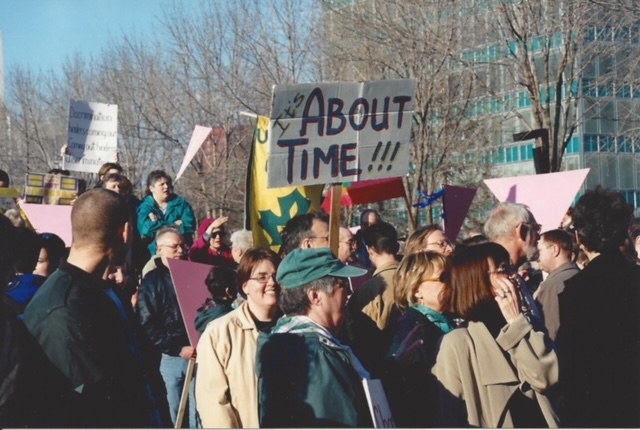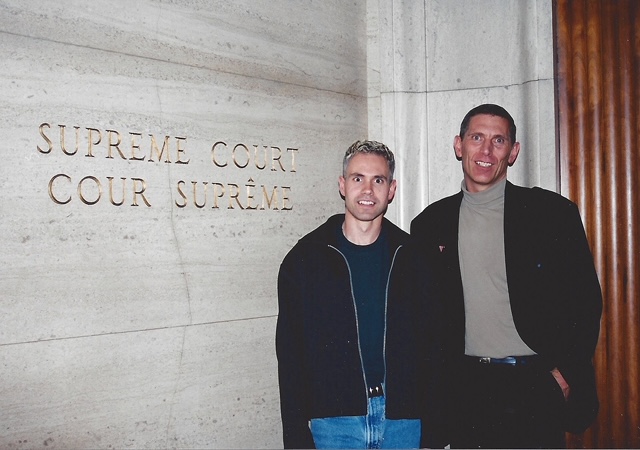Interviews with 2SLGBTQ+ Activists in Alberta
Without Discrimination: The Delwin Vriend Case
Vriend vs. Alberta: the courage, the team, and the communities that changed Alberta’s human rights law

Photo by Jo-Ann Kolmes.
Listen here to the ECAMP Podcast bonus episode Without Discrimination: The Delwin Vriend Case.
The Delwin Vriend case had a profound effect on 2SLGBTQ+ rights in Alberta, nationally, and internationally. In 1998, after a long, courageous, and determined struggle by Delwin Vriend and the 2SLGBTQ+ community, the Supreme Court of Canada held that Alberta’s omission from its human rights legislation of sexual orientation as a ground protected from discrimination was unconstitutional. The Court added sexual orientation as a protected ground into the human rights statute, so that going forward, discrimination based on sexual orientation in employment, accommodation, provision of goods and services, etc. was prohibited, and complaints of discrimination could be filed.
The new program, Without Discrimination: The Delwin Vriend Case, prepared and produced by the Alberta Labour History Institute (ALHI) with the support of Edmonton Heritage Council staff and ECAMP production coordinator Pat Hoonjan as a bonus episode of the Edmonton City as Museum’s Project ECAMP Podcast, traces the context and the story of the case through the voices of people who lived the experiences and participated in the case. Murray Billett, a longtime human rights/queer activist who was closely involved in the case, is the narrator and guide through the story. You will also hear from Delwin Vriend, from Michael Phair – who was then on Edmonton City Council and was the first openly gay elected politician in Alberta – and from four people who participated as lawyers in the case: Sheila Greckol (now a Justice of the Court of Appeal of Alberta); Douglas Stollery, CM, QC; Julie Lloyd, QC (now a Provincial Court Judge); and Lyle Kanee, QC.
The Edmonton City as Museum Project (ECAMP) is an initiative of the Edmonton Heritage Council that explores the history of the city through story.
Delwin Vriend worked as a laboratory coordinator and chemistry lab instructor at The King’s College in Edmonton. In February 1990, the President of the College called Delwin to his office and asked Delwin to confirm whether or not he was gay. Delwin confirmed this. The College’s Board of Governors then adopted a position statement on homosexuality, and shortly thereafter the President of the College asked Delwin for his resignation. Delwin declined to do so and, on January 28, 1991, was fired.
The Alberta Human Rights Commission told Delwin that they could not accept a complaint of discrimination because Alberta’s human rights legislation at the time did not include sexual orientation as a ground protected against discrimination. Delwin, with support from the community, then took the next step of bringing to the court a challenge based on the Canadian Charter of Rights and Freedoms: that Alberta’s omission of sexual orientation from its human rights legislation breached the equality rights guaranteed in section 15 of the Charter and was unconstitutional.
Without Discrimination: The Delwin Vriend Case describes the background of the discrimination and homophobia experienced by the 2SLGBTQ+ community in the time frame of the Vriend case and tells the story of the courageous and determined effort by Delwin Vriend and the community through three levels of court – up to the Supreme Court of Canada – to achieve a fundamental recognition in Alberta of equality rights based on sexual orientation.

Photo by Jo-Ann Kolmes.
The Vriend case has had significant effects. As noted by Douglas Stollery in the bonus episode, “The impact has been profound. This was the first successful gay rights case before the Supreme Court of Canada. It changed the law in Alberta to protect members of the queer community from discrimination. It changed attitudes. It led to the advancement of human rights across the country culminating in the recognition of same sex marriage, and it has been cited in cases in other countries ….” And as observed by Julie Lloyd, “The Vriend case showed us all the power of tenacity and the power of courage. … This is the work that can change the world and it does.”
A note on language and terminology in the program: at the time of the Vriend case, common references were to gay, lesbian, and queer communities. The court decisions at various points refer to “homosexuals.” Over the years, the language has properly evolved to the more inclusive Two Spirit, Lesbian, Gay, Bisexual, Transgender, Queer, + (2SLGBTQ+). The program reflects the basic terms that were used decades ago during those tumultuous times.
Join your program guide, Murray Billett, in the journey through the historic Vriend case.
For a timeline of the Vriend case, see here.
For online resources and further information, see here.
Credits
This special program is hosted and narrated by Murray Billett and was created by Billett, Don Bouzek, and Jo-Ann Kolmes.
This episode was produced by ALHI with the support of the Edmonton Heritage Council via the Edmonton City as Museum Project’s ECAMP Podcast. Thanks to Edmonton Heritage Council staff as well as ECAMP Podcast production coordinator Pat Hoonjan for helping make this program possible.
Interview excerpts of Delwin Vriend and Murray Billett are from the ALHI collection.
Program participants include Michael Phair as well as the following who were involved as lawyers in the case: Julie Lloyd, QC (now a Provincial Court Judge); Sheila Greckol (now a Justice of the Court of Appeal of Alberta); Douglas Stollery, CM, QC; and Lyle Kanee, QC.
Thanks as well to Kenneth Billett, Margie Smith-Jones, and Jo-Ann Kolmes for the headline voiceovers. Excerpts of Justice Cory’s reasons for decision were read by Don Bouzek, and excerpts of Justice Russell’s reasons for decision were read by Jo-Ann Kolmes.
Excerpts of Paula Simons and Sheila Greckol from the Chancellor’s Forum “Pride or Prejudice,” March 21, 2018, are with permission from the University of Alberta.
Without Discrimination: The Delwin Vriend Case was recorded and mixed by Ground Zero Productions at the Orange Hub in Edmonton.
Listen to Without Discrimination: The Delwin Vriend Case for a closer look at the courage, the team, and the communities that changed Alberta’s human rights law. This program is a bonus episode of the ECAMP Podcast. Subscribe via Apple Podcasts, Spotify, Stitcher, Amazon Music, and Libsyn.
Link to the ECAMP Blog on Without Discrimination: The Delwin Vriend Case.

